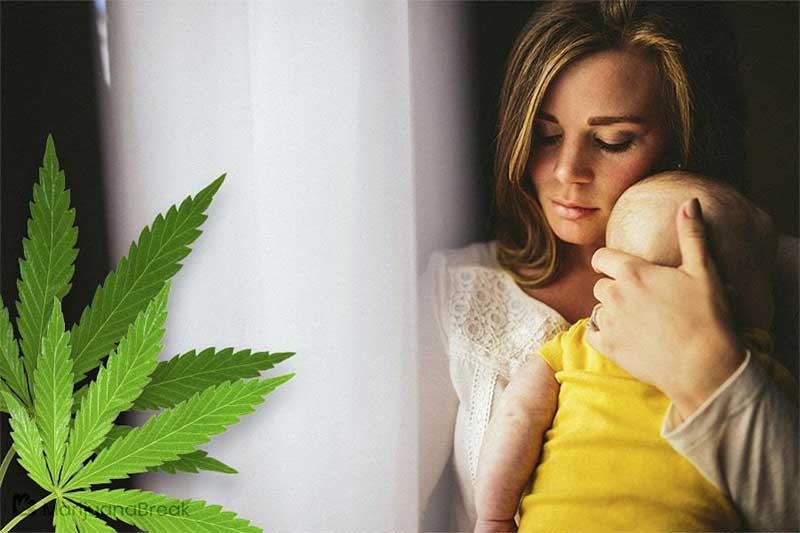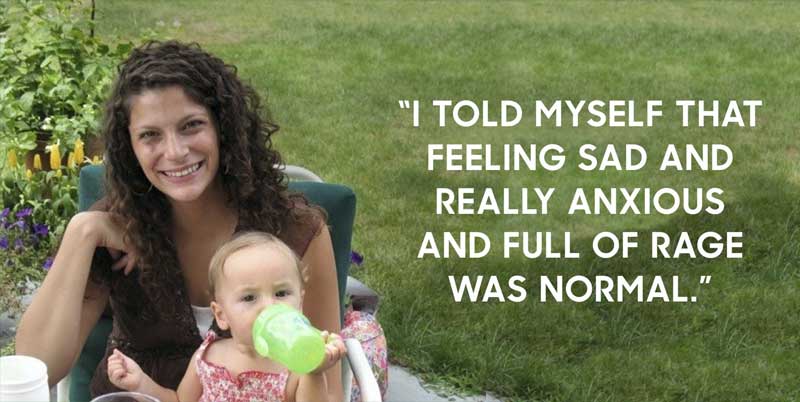MEDICAL MARIJUANA FOR POSTPARTUM DEPRESSION
What is postpartum depression?
Postpartum type of depression that you may get after you have a baby. It can start any time during your baby’s first year. That being said, it is most common for one to start to feeling the effects of post partum depression during the first 3 weeks after giving birth.
RELATED CONTENT:
WHY DOES POSTPARTUM DEPRESSION OCCUR?

A woman’s hormone levels change significantly during and after pregnancy. The rise and fall of hormones can cause mood issues, including depressive thoughts and erratic behavior.
Hormones
Your hormone levels rise when you’re pregnant. After your baby is born, they drop suddenly. This quick change can trigger depression in some women. (If you ever feel moody before you get your period, you know how hormones can affect you.)
History of depression
If you’ve had depression before, or it runs in your family, you may be more likely to have postpartum depression.
Stress and problems
If you didn’t want to be pregnant, or your partner and family don’t help you care for your baby, you’re more likely to become depressed as a new mom. The condition is also more common among women with money issues, problems with drugs or alcohol, or other sources of stress.
WHAT SHOULD YOU DO IF YOU ARE SUFFERING FROM POSTPARTUM DEPRESSION?
If you have it, you might feel sad, hopeless, and guilty. This is because you may possess feelings that don’t allow you to want to bond with or care for your baby. This is a severe form of clinical depression related to pregnancy and childbirth.
“I told myself that feeling sad and anxious and full of rage was normal.” – Goodhousekeeping.com
HOW DOES MEDICAL MARIJUANA AID IN TREATING POSTPARTUM DEPRESSION?
Many treatments for postpartum among women could be new and unproven. That being said, medical marijuana has been becoming popular among women groups for various reasons. Medical Marijuana has been proven efficient for treating anxiety disorders. A study published in the Journal of affective disorders suggests that smoking cannabis can help reduce stress levels and also help cope with anxiety and depression. In addition, medical marijuana balances the chemicals in the body to create a sense of euphoria. More women are trying to use the marijuana plant to treat common problems. This includes but is not limited to mood swings and insomnia. Both those symptoms are also common during Postpartum depression.
What Do The Signs & Symptoms of Postpartum Depression Include?
Some of the signs and symptoms of PPD include but are not limited to:
- Depressed mood or severe mood swings
- Excessive crying
- Difficulty bonding with your baby
- Withdrawing from family and friends.
- Loss of appetite or eating much more than usual
- Inability to sleep (insomnia) or sleeping too much
- Overwhelming fatigue or loss of energy
- Reduced interest and pleasure in activities you used to enjoy
- Intense irritability and anger
- Fear that you’re not a good mother
- Hopelessness
- Feelings of worthlessness, shame, guilt or inadequacy
- Diminished ability to think clearly, concentrate or make decisions
- Restlessness
- Severe anxiety and panic attacks
- Thoughts of harming yourself or your baby
- Recurrent thoughts of death or suicide
Can marijuana treat postpartum depression?
Smoking of any kind is inadvisable while pregnant or breastfeeding. Just because more women are smoking marijuana during or after pregnancy does not mean that it is safe. The danger is due to marijuana’s psychoactive cannabinoid, THC. If ingested while breastfeeding, THC can enter the baby’s bloodstream.
For women who are suffering from PPD and aren’t breastfeeding, cannabis could be a better and safer alternative to other anti-anxiety and anti-depression drugs that are commonly prescribed. It’s well known that, with the right dose, cannabis is an effective anti-depressant for both men and women.
DOES MEDICAL MARIJUANA CURE POSTPARTUM DEPRESSION?
While cannabis may not cure postpartum depression, it can help relieve its symptoms. For mothers who aren’t breastfeeding, cannabis could be the natural treatment option for easing PPD.
Doctors typically prescribe antidepressants for PPD. Most believe that there is little to no risk in taking anti-depressants during pregnancy or while breastfeeding.
Cannabis is becoming an increasingly common treatment for depression. At Buffalo’s Institute on Addictions, senior researcher Dr. Samir Haj-Dahmane found that “chronic stress reduced the production of endocannabinoids, leading to depression.” Endocannabinoids are found in the human nervous system. They regulate mood, pain sensitivity, and other important bodily processes. These neurotransmitters are also found in weed.
Dr. Haj-Dahmane explains, “Using compounds derived from cannabis to restore normal endocannabinoid function could potentially help stabilize moods and ease depression.”
How does Medical Marijuana treat anxiety disorders?
Marijuana has been proven efficient for treating anxiety disorders. A study published in the Journal of affective disorders suggests that smoking cannabis can help reduce stress levels. In addition, it can also help cope with anxiety and depression. Cannabis balances the chemicals in the body to create a sense of euphoria. More women are trying to use this plant to treat common problems such as mood swings and insomnia which is also common during PPD.
What are the Healing Herbs for PPD?
ASHWAGANDHA
Withania somnifera, commonly known as ashwagandha, Indian ginseng, poison gooseberry, or winter cherry, is the most stimulating herb in Ayurvedic medicine. The herb can restore the physical and mental strength of the body. Ashwagandha is an adaptogen, meaning it helps the body to adapt to physical, biological, and chemical stress.
The herb is also known for its aphrodisiac properties, meaning it helps to improve the reproductive health of the body. Ashwagandha is a vital therapeutic herb for PPD support as it helps in stimulating, eases stress and depression, and helps you to regain physical vitality and strength after childbirth.
CHAMOMILE
Matricaria chamomilla, commonly known as chamomile or German chamomile, is an ancient remedy used to treat menstrual problems in women, insomnia, and depression. The active ingredients present in chamomile have mild sedative effects, which can alleviate symptoms of depression in postpartum women.
During breastfeeding, chamomile is safe for you and your baby. Chamomile can also alleviate the symptoms of anxiety and restlessness in mothers suffering from PPD. This herb can help to aid better sleep in mothers who have insomnia and postpartum fatigue.
RHODIOLA
Rhodiola rosea, commonly known as Rhodiola, arctic root, or golden root, was widely used by Eurasian people for treating fatigue, depression, and anxiety for centuries. Till today, Rhodiola is used to enhance the physical and mental endurance of the body. This herb is also a natural adaptogen; hence it helps to alleviate the symptoms of adrenal fatigue, which is also responsible for PPD in new mothers.
Rhodiola has antidepressant, antioxidant and nervine properties, which help in stimulating alertness, reduce fatigue, improve mood and eases depressed mental states. The concoction of Rhodiola will provide energy and stamina to tired mothers throughout the day.
MOTHERWORT
Leonurus cardiaca, commonly known as Motherwort or lion’s tail, is an herb primarily used for women’s health and is also an excellent heart tonic. Motherwort is generally a very supportive herb for mothers and overall female health. The remedy supports uterine health before and after birth too. It can help ease postpartum childbirth pains.
Motherwort can relieve feelings of depression, stress, overwhelm, and anxiety. It has a mild sedative effect which helps in calming and soothing of nerves, alleviating the symptoms of PPD. The active components of Motherwort help to keep hormones balanced.
ELEUTHERO
Eleutherococcus senticosus, commonly known as Eleuthero, Siberian ginseng, or devil’s bush, was noted as the most precious herbs in the known world in the book – Compendium of Materia Medica. Eleuthero is not the same as Asian or American ginseng; it has completely different compounds. This herb is a natural adaptogen; Russians scientists mentioned it has a fascinating ability to help the body to adapt to stress.
Eleuthero may lack in clinical studies for use during breastfeeding, but in general, is well tolerated. It enhances physical and mental endurance in mothers after childbirth. The anti-stress effects of this herb can alleviate the symptoms of the PPD and improve quality of life measures. Eleuthero also improved the signs of chronic fatigue and aids in sleep.
CANNABIS
Cannabis is infamous for its psychotic effects yet has positive effects in treating advanced mental disorders. The use of medical marijuana or recreational hemp or hash for treating depression is rapidly gaining the attention of the medical community. However, the use of cannabis after pregnancy is highly understudied and needs more research.
Cannabis can highly relieve the effects of PPD in new mothers and are cautioned not to use it if you are going to breastfeed your baby. The endocannabinoids present in cannabis regulate mood, pain sensitivity, and aids in sleep. CBD (Cannabidiol) might be the next potential remedy to treat PPD but lacks supportive studies.
VITEX
Vitex agnus-castus, commonly known as chaste berry or monk’s pepper, is a traditional herbal remedy to treat a variety of gynecological problems like PMS, symptoms of menopause and fertility issues. This herb is mainly known to resolve the problems of the reproductive system affecting women.
Vitex reacts with dopamine receptors and decreases the hyperactivity of prolactin, which is very common in nursing mothers – resulting in the balancing of hormones estrogen and progesterone. The activity of Vitex relieves the symptoms of depression, anxiety, and cravings. This herb is a potential remedy to treat PPD, as it directly influences the changing hormonal activity in new mothers. However, due to the lack of data and its lactation suppression properties, studies suggest that it should be avoided during breastfeeding.


